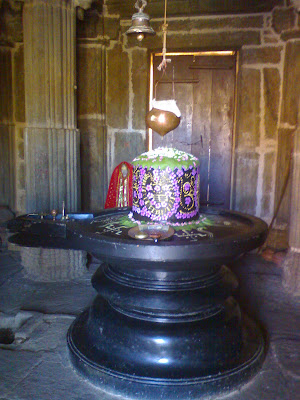
The Shiva temple within the fort complex of Kumbhalgarh...simplicity is magnificence!
Legend says that the Rana was killed in this temple, by his son, while in prayers...for interiors, see the pic below...
So mesmerised had I been with Mughal history and architecture till now that it resulted in a step-motherly treatment being given to Hindu buildings and personalities. My recent wanderings into Rajasthan changed that and it is Maharana Kumbha who made a marked dent into that confined and biased mindset. An amatuer blog post as this would not do justice to the personality he was., so I would not attempt that...however, there is something that stuck to my memory from the 'light and sound show' at Chittorgarh fort...
...it was a couplet that ended with ..."कामधेनु तांडव करिए"
and so strong was the urge to get the text , meaning and background of this verse, it made me frantically, almost madly, surf the Internet and other accessible sources, so that I could tell you the story...and I admit that this post would make more sense to those who have been to the place...
Anyways, here is how the the fairy tale fable goes...
MAHARANA KUMBHA died in A.D. 1468.
What the light and sound show missed out on, and perhaps deliberately as it would have portrayed their 'maharana' in poor light, was that sometime before his death, Kumbha's mind showed signs of derangement. He, as has been documented, sometimes talked incoherently and to himself. In this state, once he left Kumbhalgarh to visit Eklingji, a temple in Udaipur. As he arrived near the temple, a cow standing by began to dance, making a long loud sound, usually made when cows are happy.
The Maharana, who am sure must have been dazed at the antics of the otherwise calm creature, said nothing at the time, but on return to Kumbhalmer, as Kumbhalgarh was then called, in a Durbar the next day, he suddenly uttered aloud कामधेनु तांडव करिए ...and kept on repeating this till everyone around him got worried and uneasy...
As the legend goes, an astrologer had told Maharana Kumbha that he would die by the hands of a Charan, (community, the members of which write poetry, are constant companions of the Rajputs, and sing their brave deeds.). Consequently, the Maharana expelled the whole of the Charan community from Mewar and confiscated their lands. One of them, however, had remained in the guise of a Rajput and he now told the nobles of the court that he understood the reason why the Maharana repeated those words, and that he could make the Maharana stop repeating them.
The nobles took him to the Maharana and as was his habit, Rana repeated the verse to him...
The Charan got up and confronting the
Maharana, recited the following चौपाई (short poem).
जद्द धर पर जोवती दीठ नागोर धरन्ति।
गायत्री संग्रहण देख मन माही दरंती॥
सुर्कोटी तेंतीस आण नीरंता चारो।
नहिं चरन्त पीवंत मनः करती हंकारो॥
कुम्भेन राणा हणिया कलम, आजंस उर डर उतरिए।
तिन दीह द्वार शंकर तने, कामधेनु तांडव करिए..
Translated into English (taken from 'Maharan Kumbha', by Har Bilas Sarda)...it would mean:
"Seeing that cows were killed in Nagor, gayatri (cow) was in great fright.
Thirty three crores of gods used to bring grass and water for her,
but she neither ate nor drank anything.
When Rana Kumbha after killing Mussalmans (conquering Nagor) has given protection to the cows, then the cow has became delighted
and dances with joy at the door of Shankar (Mahadeva)."
The Maharana might have been temporarily upset in the head, but was no fool. Upon hearing the verse so wonderfully completed in the form of a couplet, he remarked to the Charan:
"You are no Rajput: you are a Charan, but We are very pleased with you."
The man confessed to his true identity and asked for amnesty for his brethren...begged the Maharana to permit their return. Maharatta Kumbha, magnanimous as he was, granted the request, restored their lands and yes....from that day, gave up repeating those words.
: ) Intersting story in my opinion.
Anyways, one last word...he did not die at the hands of a Charan, but his own thankless son, who, as the legend says, stole up to the Maharana while he was in prayers and stabbed him to death.

No comments:
Post a Comment